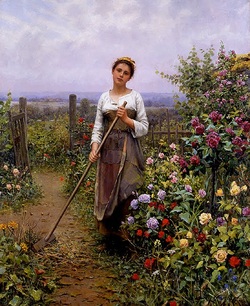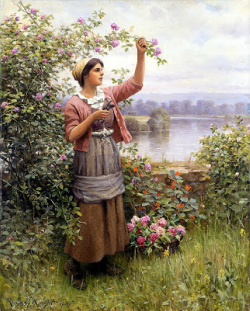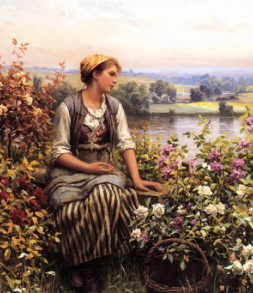 The pink roses were in bloom but the excess canes had grown too tall and brittle, so I decided to create order from the chaos. An hour later, as I simultaneously kept three small boys from running down the driveway or falling down cement stairs, I realized that raising anything, flowers or children, takes much longer than we anticipate. The roses are mine, the children are not, but the memory of raising my own came back with unexpected force. Along with the physical memory of gardening. We've been living in apartments for years, and one of the things I've missed is digging in the earth, getting my hands dirty, creating a garden that was once only lines drawn on paper. Our new home has two mature rose bushes that lean against the old metal garden shed. As I cut back cane after cane, my skin torn by thorn tips, sweat covering my body, I finally gave up on the dream of creating any semblance of perfection. I remembered what gardening feels like, how time stalls while you dig or cut or transfer, and how as the early moon shows itself high in the sky, you really haven't done half of what you'd planned. A friend is new to writing fiction. She mentioned that she was surprised by the paltry amount of pages she had at the end of the day. I remember the moment I felt the same disappointment, after writing and writing and writing, I had accumulated just a few pages of action and dialogue. Pages that still needed editing. This is why I'm primarily a poet, and rarely a fiction writer. What I came away with yesterday was an appreciation for good parents. And for gardeners, good or otherwise. For anyone who is willing to wait long months for an unpredictable outcome. This includes poets . . . Poems, like rose buses, are trimmed to nothing, they recover and grow in spite of us, and then we cut them back again. Once in awhile we are handed a poem from some mysterious source, the muse or Lorca's duende. Ta-da, there it is, fully fleshed-out and ready to show off. Most of the time there are lines that come together awkwardly, words that need reconsidering, and until it feels finished, its fate is as unknowable to us as child-raising or growing roses. The poem may turn out to be a brat or a dry cane with nothing but thorns. Physical labor brings out something in me that otherwise lies dormant, my creative drive. When I hike or ride a bike, when I play with children or pull weeds, I'm afterwards drawn to their opposite. To be physically active, even exhausted, is to later be quiet and still, open to subtle impressions that suddenly enliven my thoughts. Summer is more than being miserably hot or drinking endless iced coffees. It is about establishing a balance between the physical and the mental. Doing and being. Possibly it is why I keep hearing from writers who are once again writing. Instead of long slumbering winters where their words lay dormant, they are forced outside to participate in gardens and playgrounds, to be more physically engaged with the world. These captivating paintings are by Daniel Ridgeway Knight, http://www.danielridgwayknight.org. I love how he's made gardening, in long skirts even, look enticingly attractive. His biography says he liked to paint peasant women. Just the idea fascinates. Did the peasant women enjoy being painted? Quite possibly they did. Although many of his subjects were posed, others appear to be working or resting after work, their hair askew, faces slightly weary. I especially like this woman lost in thought among the flowers. What are her thoughts after a day of working with flowers? Who or what is on her mind? Summer is my least favorite season, but I am finding it is exactly what the body desires. Heat, a garden to tame, and long evenings with a stack of poems to consider. It will take time to finish these individual poems, they definitely need pruning. Their development into something worthwhile will take longer than I imagined. Their outcome is unknowable, but I am lost in the anticipation of what they might become.
Comments are closed.
|
Archives
October 2022
AuthorMy writing often deals with the environment, my poetry filled with allusions to natural and man-made disasters. I have unlimited hope though; there is just too much wonder in this world to become a defeatist. To quote Margaret J. Wheatley, '"Hopelessness has surprised me with patience." Categories |


 RSS Feed
RSS Feed
